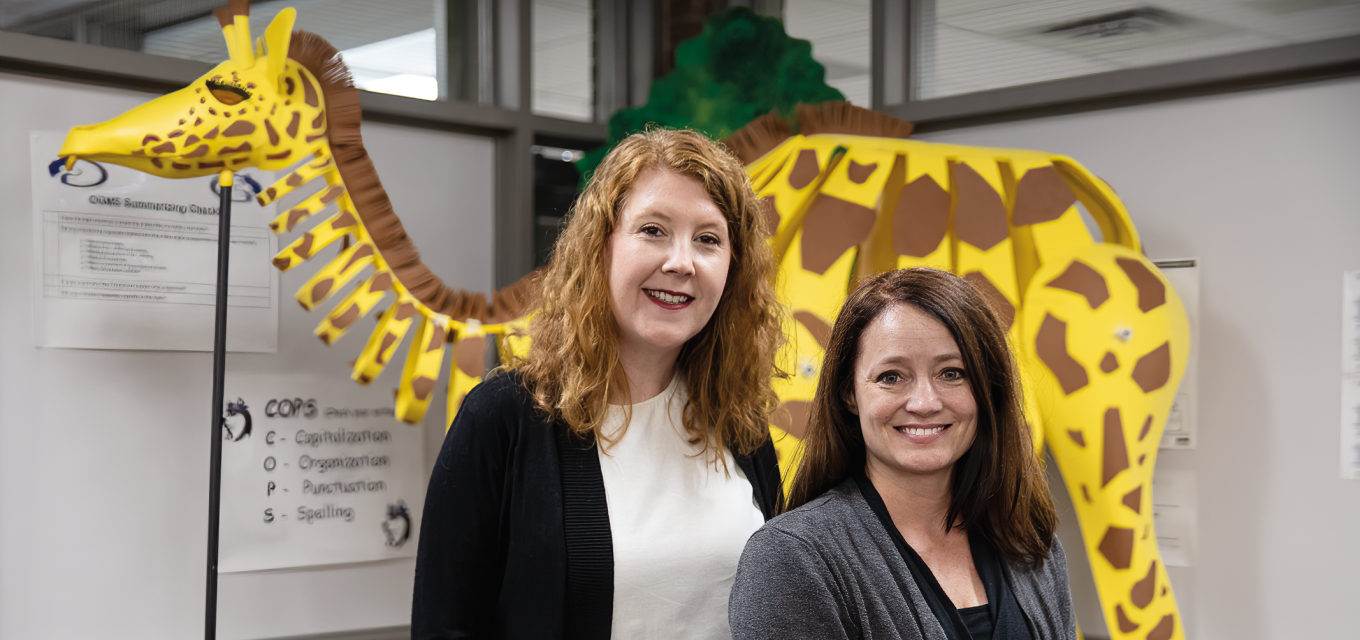2021 Fall

Mutually beneficial partnerships
CEHD researchers and school districts produce winning results.
A research-practice partnership (RPP) is a special kind of collaboration that better aligns the work of researchers with the work of practitioners. Researchers and practitioners work in tandem to create shared goals to inform program design and implementation as well as contribute to broader research fields. RPPs are long-term relationships that benefit all involved.
The Learning + Technologies (L+T) Collaborative is a research and professional learning center within the Department of Curriculum and Instruction (C&I). Formerly called the LT Media Lab, the L+T Collaborative is engaging in RPPs with Minnesota school districts in Austin and Bloomington.
“These partnerships are collaborations on the design and implementation of programs, curricula, and professional learning, as well as joint evaluation and research agendas that inform local practice and broader research literature,” says Associate Professor and L+T Collaborative Director Cassie Scharber. “The connecting thread between the two projects is technology and the ways to use it to support teaching and learning practices.”
Austin Public Schools
The L+T Collaborative is currently in its eighth year with Austin Public Schools on supporting K-12 technology integration with teachers and students. “We work with technology integration coaches, teachers, principals, and district leaders to inform technology-infused, student-driven teaching and learning practices,” says the collaborative’s Director of Community Engagement, Lana Peterson.
Together, the district and the L+T Collaborative first identified learning principles as they considered ways that technology could be used in the classroom. “As teachers and principals adopted more learner-centered learning approaches and more technology was made available in the district, our partnership has continued to evolve,” Scharber says.
Peterson says their work has been both deep and wide. “Being a research practice partner, you need to show up for schools in ways you didn’t know you would,” she says. “We have done everything from painting walls in the library to leading district-wide professional development to crying together over hardships and helping to create emergency pandemic distance learning plans within one week.”
They’ve also led or co-led professional learning programs, co-wrote grants, and worked with district tech coaches. “Austin hired one instructional technology coach for almost every building in the district,” Scharber says. “We have worked closely with these coaches for the duration of our partnership in many ways, including leading monthly sessions with the coaches as a group, co-developing district resources, and meeting individually with coaches.”
In terms of research results, Scharber and Peterson have presented at numerous conferences and published several articles, frequently in collaboration with district partners, including “A rapid response to COVID-19: One district’s pivot from technology integration to distance learning,” recently published in Information and Learning Sciences (2020).
“One of the reasons we have been so successful in our work with schools – they lead, we listen.”
Scharber and Peterson are both pleased at how their RPP with Austin has unfolded. “When the partnership started, there was not an end date established or estimated,” Scharber says. “We started working together knowing that it would be more than a year, but I don’t think we imagined it would be eight years and counting.”
Amy Thuesen, the technology integration coach at Austin High School, said the district has benefited greatly from the partnership as the L+T team provided invaluable support as the district transitioned to a one-to-one program. “They provide unique professional development for both technology and instructional coaches, assuring that technology is implemented with a learner-centered approach,” she says.
Bloomington Public Schools
The duo are currently in year two of a five-year RPP with Bloomington Public Schools focused on supporting computer science education. “Bloomington was about to begin building a K-12 formal pathway for computer science education—one of the first in the state—and they were looking for partners in this endeavor as our state policies and support in this area were non-existent,” Peterson says.
In this partnership, Peterson and Scharber, along with PhD candidates Sarah Barksdale and Rukmini Avadhanam, provide rapid cycles of feedback through research activities; share the latest research; co-create programs, curriculum, and resources; co-design and facilitate teacher professional learning; and more.
During the pandemic, Bloomington decided to launch a K-12 online school and expanded its partnership with the L+T Collaborative. “We worked alongside district coordinators to develop curriculum, identify foundational frameworks, train teachers in online pedagogy, and engage in evaluation activities,” Scharber says. “Next year, we will continue to partner on mutual problems of practice in online K-12 learning.”
John Weisser, the executive director of technology and information services for the district, says Bloomington benefits from the depth of knowledge the L+T team brings regarding computer science. “Our teachers get the best professional development possible—co-planning and co-teaching that reflects best practice—and our program gets data measurement that helps guide development,” he says. “Our partnership is uniquely effective in the close working relationship our teams have formed and in our shared perspective for achieving equitable and sustainable programs for students.”
Trust
What makes RPPs valuable is the reciprocal nature of the relationships. “In RPPs, trust is the foundation,” Peterson says. “Trust takes a long time to create. This is one of the reasons we have been so successful in our work with schools—they lead, we listen.”
Scharber says a lot of the things they do—assisting in classrooms, presenting to school boards, even bringing cakes for celebrations—are the invisible parts to doing this type of community-engaged scholarship. They are the unsung aspects of RPPs, but they are just as important as the research aspects.
“We wouldn’t do research any other way with K12 partners,” she says. “Our partnerships are authentic, human, reciprocal relationships that bring us joy.”
-Kevin Moe
Photos courtesy of Greg Helgeson, Blooming and Austin Public Schools
Learn more at lt.umn.edu